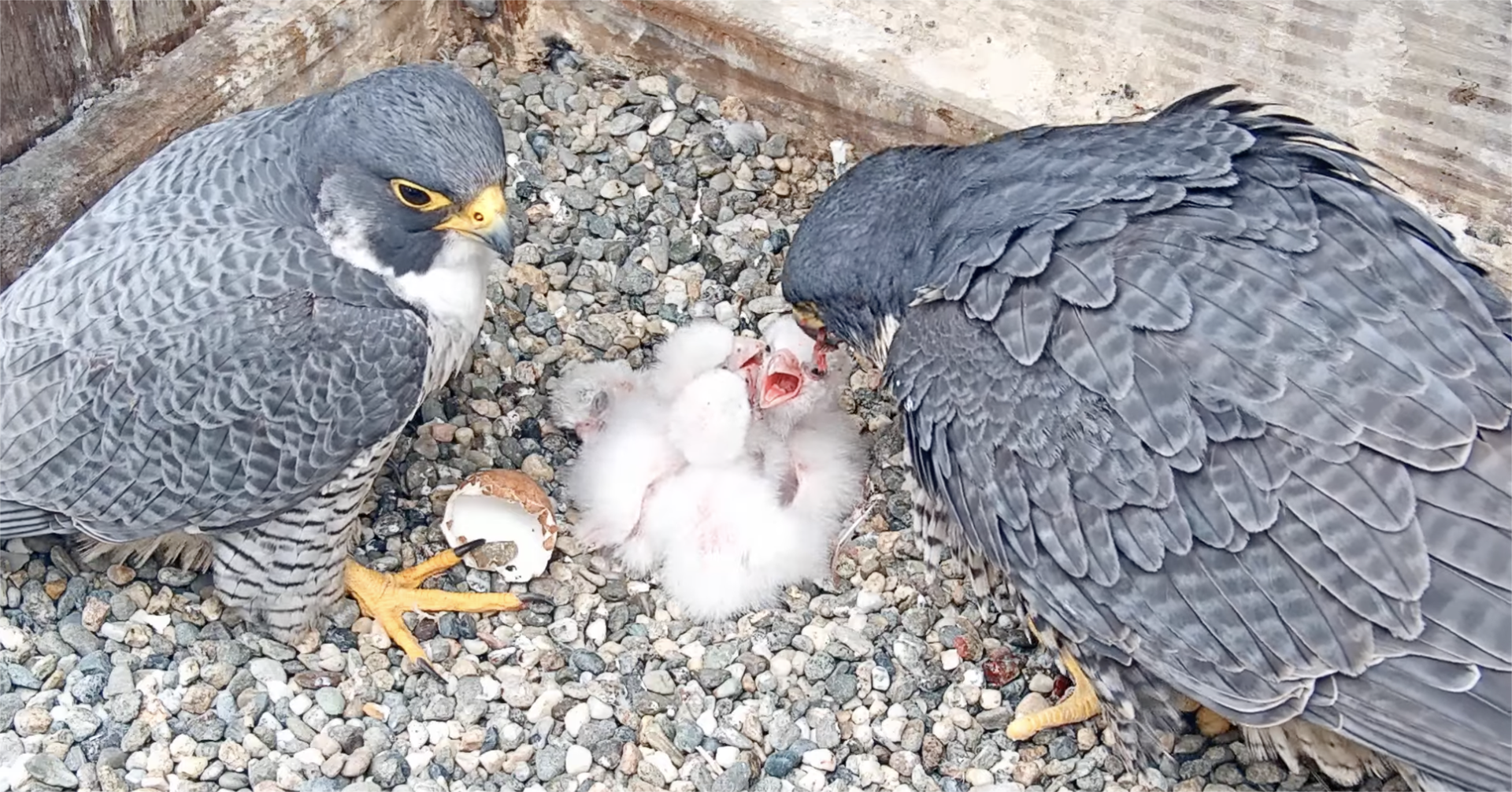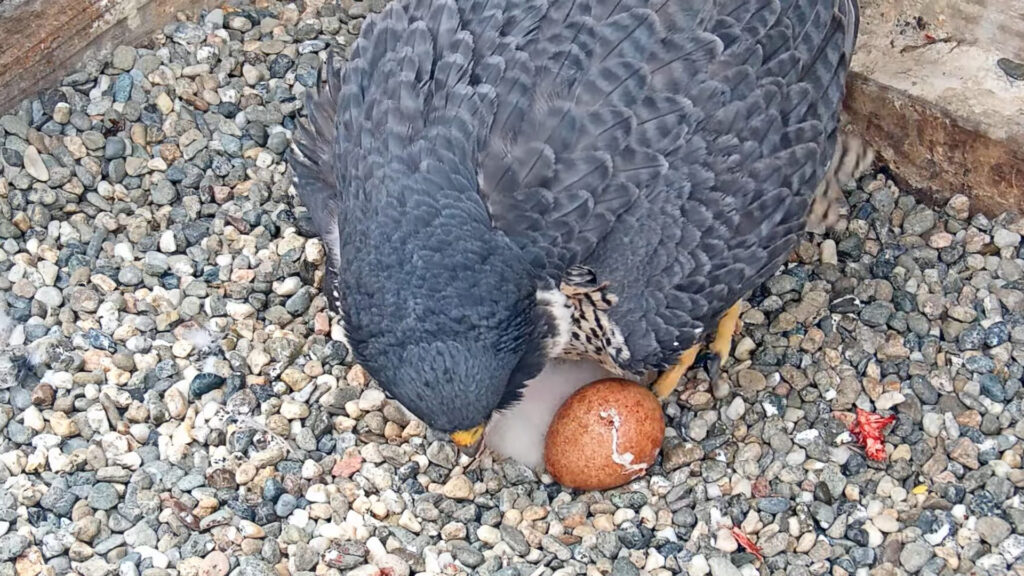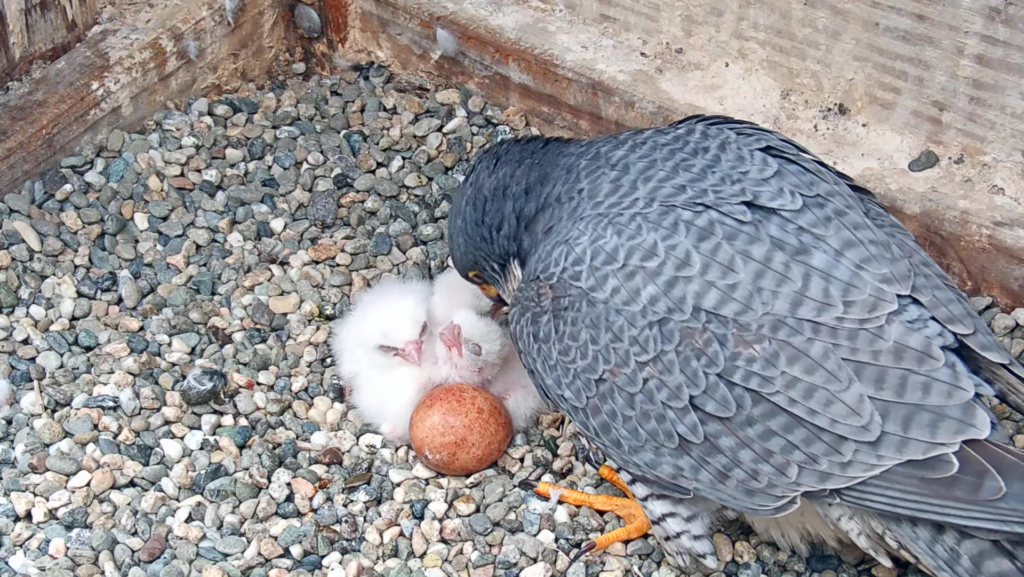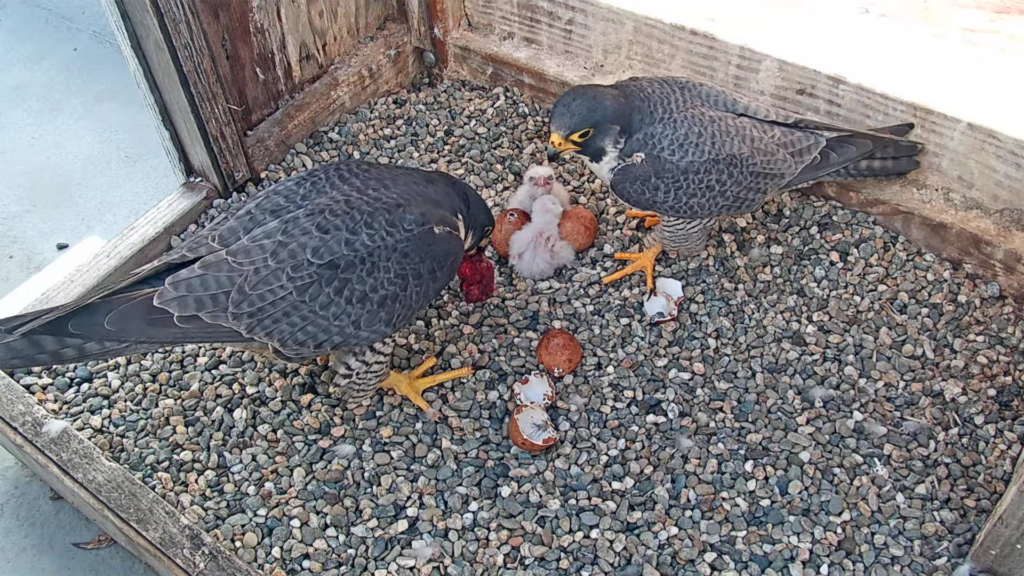UC Berkeley’s Annie the falcon sets a record: All of her eggs hatch on the Campanile
A popular community Hatch Day event today at BAMPFA celebrates four new chicks.

April 24, 2024
The eighth breeding season for Annie, UC Berkeley’s longtime female peregrine falcon, turned out to be the most successful: For the first time since 2017, all her eggs hatched in the nest on the Campanile, producing four fluffy chicks. Three emerged from their shells on Monday and one this afternoon.
“This is really exciting to see,” said Sean Peterson, an ecologist with Cal Falcons, who was watching the hatch on his computer in Minnesota. Year after year, typically one of Annie’s eggs doesn’t open. (Watch the fourth hatching in this Cal Falcons video.)

“We’ve always wondered if there was some sort of physiological or environmental effect that was causing her to have one infertile egg every year, but maybe it was just bad luck,” he said. “With four chicks, Annie and Archie are definitely going to have their wings full when the chicks get bigger.”
The new chicks bring to 22 the number of offspring Annie’s brought into the world since she arrived on campus in late 2016.
The hatching of No. 22 was observed today by guests outside the Berkeley Art Museum and Film Archive (BAMPFA), where the annual Hatch Day event was being held. A crowd viewed the nest activity in real time on BAMPFA’s giant outdoor screen via a Campanile webcam and asked questions of Cal Falcons experts.
Later today, at 6 p.m., Cal Falcons will hold a livestreamed Q&A, promising in a YouTube promo “to answer all your burning questions about Annie, Archie and their new chicks.”
Meanwhile, the chicks’ father, Archie — Annie’s newest mate — is getting high praise from Cal Falcons’ experts. Peterson said Archie took turns with Annie to sit on the eggs to incubate them and “had some adorable moments where he was quietly talking to the chicks as they were working on breaking out of their eggs.”

Archie’s been “an excellent partner for Annie,” he added. “He’s very chatty and will constantly talk to her whenever they’re together.”
Mary Malec, a member of Cal Falcons who monitors raptor nests for the East Bay Regional Park District, called Archie “a keeper” and a “hands-on dad” who likely will be pitching in soon to feed the chicks.
Archie is the latest in a dramatic succession of male partners for Annie. He arrived at the nest in January, a few weeks after Annie’s previous mate, Lou, disappeared. Lou showed up in November 2022, filling a void left by Alden, who had replaced Grinnell, Annie’s partner since 2016. Grinnell was found dead in downtown Berkeley in March 2022.
Both Annie and Archie will be keeping the chicks warm during their first 10 days of life, as they’re incapable during that time of thermoregulating for themselves.
“So we’ll see them frequently hiding under Mom or Dad,” said Peterson. Annie will be the chicks’ primary incubator, and Archie will hunt for the family’s food for about three weeks. Then Annie will join him in bringing the nestlings their meals.

The four chicks will be fitted with identification bands by a raptor biologist mid mid-May, when they’re around 23 days old, and she’ll determine at that time if they are male or female. They’ll take their first flights when they’re about six weeks old.
Peterson said it’s exciting to have nestlings on the tower again and “to see the personalities that the chicks develop as they get older and start to explore the world around them. The dynamic between the three siblings is very fun to watch.”
Malec also is delighted at rare arrival of four chicks on the Campanile. But she said she’d be “happy to see any number of chicks hatch and fledge successfully,” adding that it’s a “really, really bad year for peregrines, with the bird flu hitting really hard here in the Bay Area.”
Of Annie’s offspring, Sequoia is thought to have succumbed to bird flu in San Jose. Lux
and Lindsay died after just learning to fly. Zephyr was seen in Vallejo in fall 2023. And Larry (Lawrencium), who lives on Alcatraz Island, laid four eggs this spring and — just like her mom’s — each produced a healthy chick.